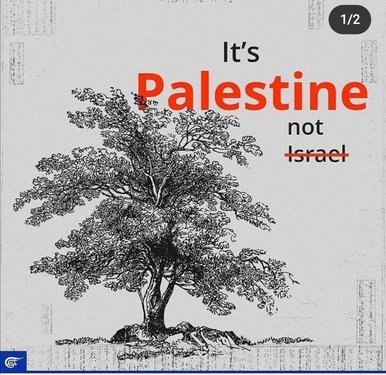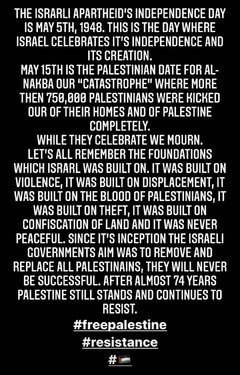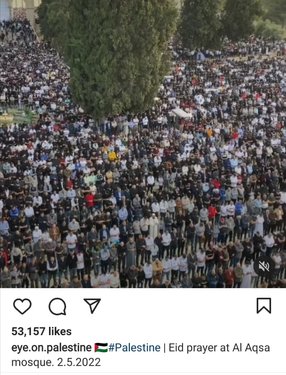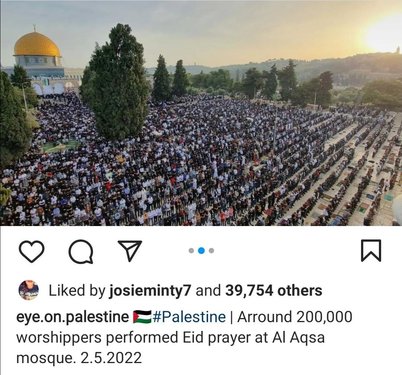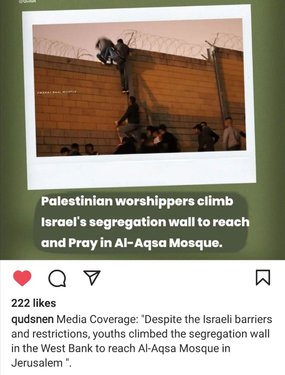-
Posts
8,466 -
Joined
-
Days Won
773
Content Type
Profiles
Forums
Events
Everything posted by ummtaalib
-
Anti-zionist Jews march to mourn the 74th anniversary of the creation of the Israeli Zionist state in Palestine May 05, 2022: Anti-Zionist Haredi (ultra-Orthodox) Jews of Mea Shearim neighborhood, #Jerusalem, march to mourn the 74th anniversary of the creation of the Israeli Zionist state in Palestine. Protesters, who call themselves "Palestinian Jews", held Palestinian flags and burned Israeli flags at the center of the neighborhood. The protest was violently attacked by Israeli police. This morning, Israeli forces raided the neighborhood to remove Palestinian flags that were hung on buildings.
-

Information on the Islamic Months
ummtaalib replied to ummtaalib's topic in General Islamic Articles
12 - Dhul- Hijjah Zul Hijjah | Great Opportunities for Great Profits Hazrat Maulana Yunus Patel Rahmatullahi 'alayh Zul Hijjah | The 10 Sacred Days Hazrat Maulana Abdul Hamid Is`haq Saheb Daamat Barakaatuhum The First Ten Days of Zul-Hijjah Shaykh Muhammad Saleem Dhorat hafizahullah 4 things to do on the blessed days of Dhul Hijjah Sunnats & Aadaab of Dhul Hijjah Dhikr: The Hallmark Of The Days Of Dhul Hijjah -

Information on the Islamic Months
ummtaalib replied to ummtaalib's topic in General Islamic Articles
11 - Dhul- Qi’dah -

Information on the Islamic Months
ummtaalib replied to ummtaalib's topic in General Islamic Articles
10 - Shawwal Fasts of the month of Shawwal -

Information on the Islamic Months
ummtaalib replied to ummtaalib's topic in General Islamic Articles
9 - Ramadan Ramadhaan forum -

Information on the Islamic Months
ummtaalib replied to ummtaalib's topic in General Islamic Articles
8 - Sha’ban Sha’ban - A Month for Rehearsal The Significance of the 15th of Sha’ban Is the virtue of 15th of Sha’ban proven, or is it a bid’ah (innovation)? What should be done in this night Shaʿban: Preparation For Ramadan -

Information on the Islamic Months
ummtaalib replied to ummtaalib's topic in General Islamic Articles
7 - Rajab True Appreciation of Rajab Month of Rajab- Do's & Don'ts Rajab Authenticity of the Rajab Du'a -

Information on the Islamic Months
ummtaalib replied to ummtaalib's topic in General Islamic Articles
6 - Jumada Thani -

Information on the Islamic Months
ummtaalib replied to ummtaalib's topic in General Islamic Articles
5 - Jumada Awwal -

Information on the Islamic Months
ummtaalib replied to ummtaalib's topic in General Islamic Articles
4 - Rabi’ Thani -
The Sunnah of meeting the Haji
-
Are both Qurbani and Damm-Shukr necessary in Hajj
-
When are we exempt from fasting?
-
Not Fasting Due To Illness - Qadha or Compensation
-
Israeli court paves way for eviction of 1,000 Palestinians from West Bank area Land to be repurposed for military use in one of the biggest expulsion decisions since 1967 occupation After a two-decade legal battle, Israel’s high court has ruled that about 1,000 Palestinians can be evicted from an area of the West Bank and the land repurposed for Israeli military use, in one of the single biggest expulsion decisions since the Israeli occupation of the Palestinian territories began in 1967. About 3,000 hectares of Masafer Yatta, a rural area of the south Hebron hills under full Israeli control and home to several small Palestinian villages, was designated as a “firing zone” by the Israeli state in the 1980s, to be used for military exercises, in which the presence of civilians is prohibited. According to the Geneva conventions pertaining to humanitarian treatment in war, it is illegal to expropriate occupied land for purposes that do not benefit the people living there, or to forcibly transfer the local population. Israel has argued, however, that the Masafer Yatta villagers living in Firing Zone 918, farming and raising animals there, were not permanent residents of the area when the firing zone was declared, and therefore have no rights to the land. The high court decision published overnight on Wednesday – ahead of Israel’s Independence Day on Thursday, a public holiday – accepted the state’s argument that the community could not prove they were residents before the 1980s, despite expert testimony and literature presented in court that showed the area has been inhabited for decades. The judges also rejected the claim that the “prohibition of forcible transfer set forth in international law is customary and binding”, calling it instead a “treaty norm” that is not enforceable in a domestic court, according to the Israeli international human rights lawyer Michael Sfard. The Israeli defence ministry, one of the bodies responsible for Israeli policy in the occupied West Bank, did not immediately respond to a request for comment. Since the judges’ decision was unanimous it is not clear whether any further Israeli legal channels are available for the residents of the eight Masafer Yatta villages to appeal. While the ruling did not order evictions, should it choose to do so Israel could now move to forcibly expel the Palestinians at any time. “The court decision is a racist decision taken by a settler judge [David Mintz, who lives in an illegal settlement in the West Bank],” said Nidal Younes, the head of the Masafar Yatta village council. “We have been fighting with Israel in the courts for the last 22 years and it took this judge five minutes to destroy the lives of 12 villages and the people who are dependent on the land. “In the end, history repeats itself: Nakba after Nakba,” he said, using the Arabic term for the expulsion of Palestinians from Israel in wars surrounding the state’s creation in 1948. Eighteen per cent of the occupied West Bank has been declared “firing zones” for Israeli military training since the 1970s. According to the minutes of a 1981 ministerial meeting, the then agriculture minister, Ariel Sharon, later prime minister, proposed creating Firing Zone 918 with the explicit intention of forcing local Palestinians from their homes. Palestinian communities living within firing zones have been repeatedly threatened with home demolitions and the confiscation of agricultural land because they lack building permits, which are issued by the Israeli authorities and are nearly impossible to obtain. Residents of Masafer Yatta have also been subjected to intensifying attacks from nearby illegal Israeli settler communities in recent years. In 1999, 700 residents of Firing Zone 918 were evicted, but after an appeal by the Association for Civil Rights in Israel (ACRI) the supreme court issued an injunction allowing the residents to return until a final decision was made by the high court. The injunction had remained the uneasy status quo until Wednesday’s ruling. Compromises put forward by the Israeli state that would have allowed Palestinian villagers to work inside the firing zone on weekends, Israeli holidays and for two non-consecutive months of the year were rejected by the Masafer Yatta community on the grounds that it would not be possible to sustain farming activities or make a living. Breaking the Silence, an Israeli NGO, said in a statement: “The high court has just green-lighted the largest population transfer in the history of the occupation since the early 1970s. “Deportation of over 1,000 people in favour of expanding settlements, outposts and training of Israel Defence Forces soldiers is not only a humanitarian catastrophe that could set a precedent for other communities across the West Bank, but also a clear step in de facto annexation of the occupied Palestinian territories and cementing military rule indefinitely.” theguardian.com
-
Forced eviction of Masafer Yatta Israeli apartheid court issued the final decision of Masafer Yatta case. Eight Palestinian villages will be completely evicted, ethnically cleansed at any moment. This is a brutal crime of forcible transfer—1200 people will be removed from their land. Stand with Masafer Yatta.Stop Israel’s policy of ethnic cleansing.Stop the crime of forcible transfer.Defund racist settler organizations. #DefundRacism #save_masafer_yatta Sami H Huraini (@samihuraini) • Instagram photos and videos
-
The Israeli occupation forces raid Al Qibli prayer hall after breaking its doors. 5.5.2022 Israeli soldiers assault worshippers in the courtyards of Al-Aqsa Mosque. 5.5.5.2022 The Israeli occupation forces prevent worshippers from entering Al Aqsa mosque through Lion's gate. 5.5.2022 The Israeli occupation forces detain arround 50 Palestinian youth in Al Aqsa mosque. 5.5.2022 Around 600 Israeli settlers broke into Al Aqsa mosque under the protection of occupation forces, this morning. 5.5.2022 www.instagram.com/eye.on.palestine/
-
Isra-eilis celebrate "Independence day" @friendsofalaqsa 🔴 Israeli Occupation Forces have violently assaulted Palestinian worshippers at Al-Aqsa AGAIN this morning to make way for settlers to mark Israel's “Independence Day” (74 years of occupation and apartheid against Palestinians) 🔴 In this latest desecration of the sacred site, Israeli bullets smashed the glass of Al-Aqsa’s pulpit 🔴 This is to allow more incursions by illegal Israeli settlers. This poses a dangerous threat to the status quo of Al-Aqsa 🔴 If this repeated violence was seen at any other place of worship, our politicians would have taken action by now. They must TAKE ACTION for Al-Aqsa
-
-
The Israeli occupation forces withdraw from Al Aqsa mosque after raiding it after Fajir (Dawn) prayer, today. 29.4.2022 www.instagram.com/p/Cc7BJouFwQx/
-
Worshippers at Al-Aqsa under attack again today 29.4.2022 The Israeli occupation forces besiege worshippers inside Al Qibli prayer hall and break its windows to fire tear gas and rubber coated steel bullets at them. www.instagram.com/p/Cc64nTeIkeU/ The Israeli occupation forces block the gates of Al Qibli Prayer Hall which chains while besieging dozens of worshippers inside it. 29.4.2022 www.instagram.com/p/Cc6-029F-QD/ The Israeli occupation forces shoot rubber coated steel bullets at worshippers after raiding Al Aqsa mosque. 29.4.2022 www.instagram.com/p/Cc66Q_bod0l/
-


